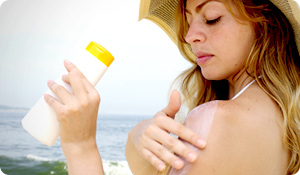
SPF 30, SPF 15, SPF 70, SPF 4. The numbers seem to rush at you from the drugstore shelves as you stare at the dizzying array of brightly colored sunscreen bottles. If an SPF (sun protection factor) of 30 is good, is 70 better? Is there a minimum SPF you should look for in order to avoid getting burned or sustaining skin damage?
According to the American Academy of Dermatology, if you have to be in the sun, you should choose a broad-spectrum sunscreen (meaning a sunscreen that blocks both wrinkle-causing ultraviolet A and sunburn-causing ultraviolet B rays) with a minimum SPF of 15. This is true even on cloudy days. An SPF of 15 means that theoretically you can safely be in the sun up to 15 times longer than you could without any sunscreen at all. The AAD says that the higher the SPF, the better protected you are from UVB rays. But be warned: Higher SPFs are not a license to stay in the sun for hours on end.
According to experts, those super-high SPFs such as 70 or 100 offer only marginally greater protection than SPFs of 15 or 30. The real problem is that most of us do not use any sunscreen well enough to be adequately protected. In fact, dermatologists say it's better to use a lot of SPF 30 sunscreen than a skimpy amount of SPF 70. How to save your skin? Try to buy water-resistant sunscreen, but know that even that wears off in the water after awhile. For maximum protection, you must be liberal with the amount you use (visualize the contents of a shot glass and aim to use that amount on your entire body), reapply it every two hours or more often if you've been in the water, and apply it under your clothing unless you're wearing special protective gear (a plain white T-shirt has an SPF of only 3). Keep a wide-brimmed hat on at all times when you're outside, wear sunglasses, be extra-careful on sun-reflecting surfaces such as snow and sand, and--most importantly--limit your sun exposure to less intense periods such as before 10 am or after 6 pm. The unfortunate truth is that even following all of this advice, you may still be exposed to some ultraviolet rays, so be vigilant about checking your entire body for pre-cancerous moles on a regular basis.





